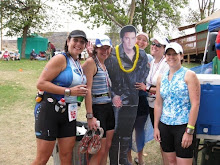Feb 8 2011
on espnW
I'm an addict, pure and simple. But my addiction has brought me five world championship crowns, a little bit of money, chaffing and huge oversized calves. The drug? Sports. And like any addict, when I don't get my fix, I become like Cruella De Vil (with a decidedly dodgy haircut). I get grumpy, I throw my toys out of the pram, I suffer cold turkey (nothing to do with Thanksgiving leftovers), and I chew on my nails -- basically metamorphosing from a relatively stable, sporty person to Godzilla.
I am sure many of you can relate. We all do sports for different reasons: to get fit, to tone up flabby parts, to wear skin-tight Lycra, to justify vacuum-cleaner-style eating habits or to pick up girls/boys. And, yes, for the undisputed "high" that it gives us, the satisfaction that comes from reaching that fine line between pleasure and pain, the masochistic seed that thrives on the endorphin rush that only a good hard training session or race can provide. I know I have always had an addictive personality, but this obsession with sports didn't develop overnight. I think I gradually morphed from a once-a-week kind of gal to a full-blown, "must-get-the-daily-fix" sport junkie.
Last year I read an article about two former drug addicts who used triathlon to rebuild their lives: the 20-year-long high they had gotten from heroin was replaced by the rush of sporting endorphins. The same was true of a guy, Matt, that I met at Ironman Australia in 2008. He had been a drug addict since his early teens and, having reached a heroin-fueled rock bottom, decided to change his life. I was fortunate enough to be there to watch him cross the finish line and realize his dream of becoming an Ironman. He was still an addict -- but he had just changed his drug of choice.
Unlike glugging a bottle of whisky or eating 10 bars of chocolate a day, exercise addiction can be harder to acknowledge, given that exercise is generally seen as a splendid healthy activity to undertake. I am not saying we all push the limits and suffer the ill effects of our addiction. But for those who teeter on the brink, myself included, there are a few ways of preventing a sporting addiction from becoming a negative force.
I have to listen carefully and honestly to my body. I have learned to recognize when I can push it that little bit further, but also when to back off and take some rest. For example, last Friday I didn't train, and I didn't feel in the least bit guilty. I am slowly seeing recovery as part of training, not a forced add on. And I came back this weekend all the better for it. And you know what? There was no cold turkey -- except in my sandwiches. I also have to be prepared to change and adapt. For example, when I broke my arm last year, I couldn't train the way I wanted, and this disrupted my routine. But I had to focus on what I could do, rather than couldn't do. I had to channel my addiction into the cross trainer and swiss ball -- adapting and accepting the need for change, rather than becoming frustrated with my forced inability to follow my predetermined plan.
It is often so hard to be objective about our fitness, body weight, personality and attitude, and, hence, the importance of surrounding yourself with family, friends, coaches and others. We all need a second pair of eyes to spot potential warning signs of negative addiction. And, more importantly, to be prepared to listen and act on this advice.
For most of us, sports are ultimately a healthy addiction, we just need to be able to control those cravings. And sometimes, instead of succumbing to the sporting urges, let's break open a bar of chocolate, crack open a bottle of wine or have an industrial-sized cup of full-fat coffee instead. After all, everything in moderation, right?!





















1 comment:
Easily Increase Your ClickBank Banner Commissions And Traffic
Bannerizer made it easy for you to promote ClickBank products by banners, simply go to Bannerizer, and grab the banner codes for your picked ClickBank products or use the Universal ClickBank Banner Rotator Tool to promote all of the ClickBank products.
Post a Comment